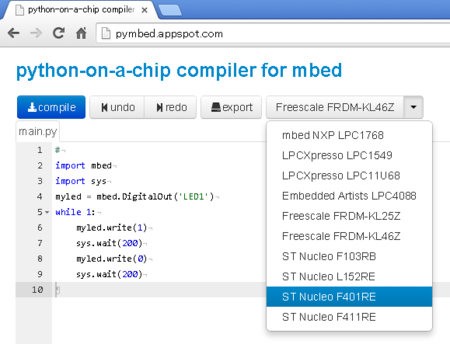Nucleo-F401REでpython-on-a-chip(LEDチカチカ編)
Nucleo-F401REでPythonのサブセットのpython-on-a-chipを動かしてLEDチカチカするまでの簡単な手順です。
Nucleo-F401REの入手
国内で入手できる主な通販サイトです。
- http://akizukidenshi.com/catalog/g/gM-07723/ 秋月電子通商
- http://www.marutsu.co.jp/shohin_236960/ マルツパーツ館
- http://www.switch-science.com/catalog/1619/ スイッチサイエンス
- http://eleshop.jp/shop/g/gE47412/ 共立エレショップ
USBケーブル(mini USB)は付属していませんので別途入手して下さい。
ファームウェアの更新
以下のページの手順に従ってNucleo-F401REのファームウェアを更新します。
http://mbed.org/teams/ST/wiki/Nucleo-Firmware
動画での更新手順の説明です。
Getting started with ARM mbed Integrated Development Environment
http://youtu.be/BrMw5TNQROo?t=1m39s
プログラミング
python-on-a-chipオンラインコンパイラのサイトを開く。
http://pymbed.appspot.com/ python-on-a-chip compiler for mbed
ターゲットを ST Nucleo F401RE に変更します。

以下のコードがエディタに入力されているのを確認します。
# import mbed import sys myled = mbed.DigitalOut('LED1') while 1: myled.write(1) sys.wait(200) myled.write(0) sys.wait(200)
compileボタンをクリックすると main_F401RE.bin がダウロードされるのでNUCLEOドライブに保存する。
保存が完了するとプログラムが自動実行されてLEDがチカチカします。
動画での実行手順の説明です。
スレッドとジェネレーターを使ったLチカ例。
import mbed import sys myled = mbed.DigitalOut('LED1') def toggle(): while 1: yield 0 yield 1 def mythread1(): for n in toggle(): myled.write(n) sys.wait(200) sys.runInThread(mythread1) while 1: print sys.heap() sys.wait(1000)
MRT.cpp
#include "MRT.h" MRT::MRT(int channel) { LPC_SYSCON->SYSAHBCLKCTRL |= (1<<10); // enable MRT LPC_SYSCON->PRESETCTRL |= (1<<7); // reset MRT _ch = &LPC_MRT->Channel[channel]; _ch->CTRL |= (1<<1); // one-shot } void MRT::write(uint32_t interval) { _ch->INTVAL = interval | (1<<31); // and LOAD _ch->STAT |= 0x01; } int MRT::status() { if (_ch->STAT & 1) { return IDLE; } return RUNNING; } void MRT::wait_ms(uint32_t timeout_ms) { write((SystemCoreClock/1000) * timeout_ms); while(status() == RUNNING); } void MRT::wait_us(uint32_t timeout_us) { write((SystemCoreClock/1000000) * timeout_us); while(status() == RUNNING); } uint32_t MRT::read() { return _ch->TIMER; }
MRT.h
#pragma once #include "LPC8xx.h" #define IDLE 0 #define RUNNING 1 class MRT { public: MRT(int channel); /** write down counter * @param interval start count */ void write(uint32_t interval); /** read down counter */ uint32_t read(); int status(); void wait_ms(uint32_t timeout_ms); void wait_us(uint32_t timeout_us); protected: MRT_Channel_cfg_Type* _ch; };
Multi-Rate Timer (MRT)
#include "mbed.h" DigitalOut led1(LED1); extern "C" void MRT_IRQHandler() { if (LPC_MRT->Channel[3].STAT & 1) { led1 = !led1; LPC_MRT->Channel[3].STAT |= 1; // clear interrupt } } int main() { LPC_SYSCON->SYSAHBCLKCTRL |= 1<<10; // enable MRT LPC_SYSCON->PRESETCTRL |= 1<<7; // reset MRT LPC_MRT->Channel[3].INTVAL = (SystemCoreClock/5)|0x80000000; // 5Hz and LOAD LPC_MRT->Channel[3].CTRL |= 1; // enable interrupt NVIC_EnableIRQ(MRT_IRQn); while(1) { __wfi(); } }
main.cpp on LPC1114FN28
#include "mbed.h" #include "SWDSerial.h" SWDSerial pc; LocalFileSystem local("local"); int main() { FILE* fp = fopen("/local/MBED.HTM", "r"); // SYS_OPEN if (fp) { for(int i = 0; i < 176; i++) { pc.putc(fgetc(fp)); // SYS_READ,SYS_WRITEC } fclose(fp); // SYS_CLOSE } exit(0); // SYS_EXIT }
workspace_tools/export_example.py
# export_example.py 2013/8/11 """ mbed SDK Copyright (c) 2011-2013 ARM Limited Licensed under the Apache License, Version 2.0 (the "License"); you may not use this file except in compliance with the License. You may obtain a copy of the License at http://www.apache.org/licenses/LICENSE-2.0 Unless required by applicable law or agreed to in writing, software distributed under the License is distributed on an "AS IS" BASIS, WITHOUT WARRANTIES OR CONDITIONS OF ANY KIND, either express or implied. See the License for the specific language governing permissions and limitations under the License. """ import sys from os.path import join, abspath, dirname, exists ROOT = abspath(join(dirname(__file__), "..")) sys.path.append(ROOT) from workspace_tools.paths import * from workspace_tools.utils import mkdir, cmd, copy_file from workspace_tools.export import export from shutil import copytree EXPORT_DIR = join(BUILD_DIR, "export_example") USER_WORKSPACE = join(EXPORT_DIR, "user_workspace") USR_PRJ_NAME = "example" USER_PRJ = join(USER_WORKSPACE, USR_PRJ_NAME) USER_LIB = join(USER_PRJ, "lib") USER_SRC = join(USER_PRJ, "src") TEMP = join(USER_WORKSPACE, ".temp") def setup_test_user_prj(): if exists(USER_PRJ): print 'Test user project already generated...' return # Build project directory structure for d in [USER_LIB, USER_SRC]: mkdir(d) # Sources print 'Copying sources...' open(join(USER_SRC, "main.cpp"), 'w').write("""#include "mbed.h" DigitalOut myled(LED1); int main() { while(1) { myled = 1; wait(0.2); myled = 0; wait(0.2); } } """) #copy_file(join(TEST_DIR, "rtos", "mbed", "basic", "main.cpp"), join(USER_SRC, "main.cpp")) #copytree(join(LIB_DIR, "rtos"), join(USER_LIB, "rtos")) # FAKE BUILD URL open(join(USER_SRC, "mbed.bld"), 'w').write("http://mbed.org/users/mbed_official/code/mbed/builds/976df7c37ad5\n") def fake_build_url_resolver(url): # FAKE BUILD URL: Ignore the URL, always return the path to the mbed library return {'path':MBED_LIBRARIES, 'name':'mbed'} def test_export(toolchain, target, expected_error=None): if toolchain is None and target is None: base_dir = join(TEMP, "zip") else: base_dir = join(TEMP, toolchain, target) temp_dir = join(base_dir, "temp") mkdir(temp_dir) zip_path, report = export(USER_PRJ, USR_PRJ_NAME, toolchain, target, base_dir, temp_dir, False, fake_build_url_resolver) if report['success']: export_name = join(EXPORT_DIR, "%s_%s_%s.zip" % (USR_PRJ_NAME, toolchain, target)) #cmd(["mv", zip_path, export_name]) copy_file(zip_path, export_name) print "[OK]" else: if expected_error is None: print '[ERRROR] %s' % report['errormsg'] else: if (zip_path is None) and (expected_error in report['errormsg']): print '[OK]' else: print '[ERROR]' print ' zip:', zip_path print ' msg:', report['errormsg'] if __name__ == '__main__': setup_test_user_prj() for toolchain, target in [ ('uvision', 'LPC1768'), ('uvision', 'KL25Z'), ('uvision', 'LPC1114'), ('uvision', 'LPC11U24'), ]: print '\n=== Exporting to "%s::%s" ===' % (toolchain, target) test_export(toolchain, target)